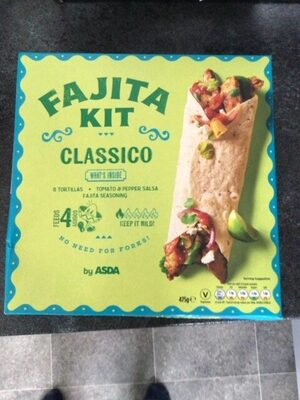
Barcode: 27244968
Fajita kit
HALAL
📝 Reason: All ingredients listed are either plant-based or commonly accepted as Halal. The only ingredient marked as Doubtful is ‘Flavouring’ due to unspecified source. However, since no Haram ingredients were found and the majority are clearly Halal, the product is classified as Halal.
🏷️ Category: N, /, A
📄 Certificates: Vegetarisch
Ingredients:
Details
Understanding the Halal Status of Fajita Kit
In the world of culinary delights, ensuring that your choices align with your beliefs is crucial. One such product that’s gaining popularity is the Fajita Kit. But is this product Halal? Let’s explore the details thoroughly to find out.
Halal Certification and Its Importance
Halal certification signifies that a product complies with Islamic dietary laws. The Fajita Kit is labeled as Halal, indicating that it meets these standards, and does not contain any Haram (forbidden) ingredients. So, what exactly does a Halal classification entail for this specific product?
Ingredient Breakdown
The Fajita Kit consists of the following ingredients:
- Fortified Wheat Flour
- Water
- Vegetable Oils (Palm, Rapeseed)
- Glycerol (E422)
- Citric Acid (E330)
- Malic Acid (E296)
- Diphosphates (E450a)
- Sodium Carbonates (E500)
- Potassium Sorbate (E202)
- Calcium Propionate (E282)
- Carboxy Methyl Cellulose (E466)
- Mono – and Diglycerides of Fatty Acids (E471)
- Sugar
- Tomatoes
- Onions
- Tomato Paste
- Peppers
- Modified Maize Starch
- Spirit Vinegar
- Jalapeño Peppers
- Rapeseed Oil
- Salt
- Garlic Purée
- Cumin Powder
- Coriander Powder
- Coriander Leaf
- Black Peppercorns
- Flavouring
- Potato Starch
- Spices (Paprika, Chilli, Cumin)
- Cornflour
- Onion Powder
- Garlic Powder
- Fat-Reduced Cocoa Powder
- Dehydrated Garlic
- Herbs (Basil, Oregano)
Each ingredient has its own story in terms of Halal compliance:
Ingredient Analysis
- Fortified Wheat Flour: Commonly used in food products and generally considered Halal.
- Water: Essential for life and universally Halal.
- Vegetable Oils: Derived from plants (Palm, Rapeseed), which are Halal.
- Glycerol: An E-number food additive derived from plant sources, considered Halal.
- Citric Acid: Generally derived from citrus fruits, Halal.
- Malic Acid: Naturally occurring in fruits and Halal.
- Diphosphates: Used as a raising agent and generally Halal.
- Sodium Carbonates: A common food additive, Halal.
- Potassium Sorbate: A preservative that is generally Halal.
- Calcium Propionate: Another preservative that is considered Halal.
- Carboxy Methyl Cellulose: A stabilizer often found in Halal products.
- Mono – and Diglycerides of Fatty Acids: Generally Halal if derived from plant sources.
- Sugar: Widely regarded as Halal.
- Vegetables: Tomatoes, Onions, Peppers, etc., are plant-based and Halal.
- Spirit Vinegar: Generally Halal in nature.
- Spices and Herbs: Such as Cumin, Oregano, and Basil are Halal.
- Flavouring: This ingredient raises some doubts as its source is unspecified, making it a point of concern.
Despite the inconclusive nature of the ‘Flavouring’ ingredient, the Fajita Kit can be considered Halal overall. The majority of ingredients are plant-based or widely accepted as compliant with Halal standards.
Conclusion
For those adhering to Halal dietary guidelines, the Fajita Kit represents a compliant choice. With the assurance of mostly definitively Halal ingredients and an overall Halal status, it allows you to indulge in culinary creativity and enjoy flavorful fajitas without concern. Always ensure that the specific product variant is Halal certified for peace of mind in your meals.
